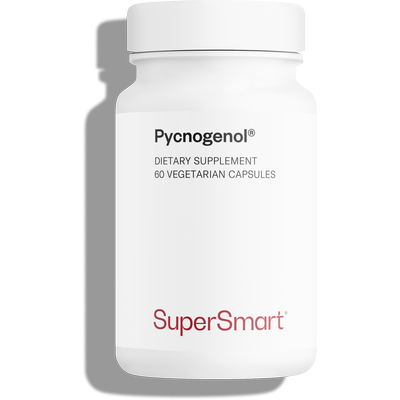Pycnogenol: what dose should you take to benefit from its effects?

Pycnogenol is a generic term for an extract of maritime pine bark (specifically, Pinus Pinaster) containing oligoproanthocyanidins or OPCs. Also known as proanthocyanidins, these are flavonoid compounds, antioxidant metabolites present in certain fruits and vegetables. OPCs are found in grape seeds and other pine species (Pinus resinosa and Pinus strobus) but at the moment, the term Pycnogenol refers to the bark extract of Pinus Pinaster. The extract’s patent and name are held by a Swiss company.
Indications for Pycnogenol
Pycnogenol is indicated for the following disorders (1):- Venous insufficiency: this condition is the result of circulation changes in the lower limbs following deterioration of the vein walls. It produces swelling of the legs, varicose veins and vein thrombosis in the most severe cases.
- Arthritis: this is characterised by gradual deterioration of bone cartilage, and causes pain, swelling and stiffness in the joints.
A number of studies have been conducted to establish the therapeutic benefits of Pycnogenol. The latest of these suggest that this extract may be recommended for treating:
- Hypertension: a study published in the Iranian Journal of Public Health demonstrated the efficacy of Pycnogenol in treating this condition. The study monitored 549 individuals with high blood pressure who were given Pycnogenol at doses of between 150 mg and 200 mg/day. (2)
- Complications of diabetes: ulcers and retinopathy are two complications of diabetes that are improved by taking Pycnogenol. (1)
- Arteriosclerosis and cardiovascular disease in general: Pycnogenol has an anticoagulant and antiplatelet action. It has also been studied in relation to preventing cardiovascular disease, and in particular, to treating arteriosclerosis. Administration of 450mg/day to a group of 40 smokers was seen to reduce platelet aggregation.
- The compound may also have lipolytic effects, with increases in levels of HDL (high-density lipoprotein or ‘good cholesterol’), hence its potential in lowering the risk of cardiovascular disease (1) and reducing weight.
Pycnogenol: recommended doses
In terms of the dose of this supplement, which is available in both tablet and capsule form, and its therapeutic effects, past and ongoing studies suggest that:
Pycnogenol’s antioxidant action is observable at a dose of 50 mg/day. For treating medical conditions such as hypertension, arthritis, venous insufficiency and diabetes complications, 150mg to 300mg/day – that’s 50mg-100mg three times a day – is an effective dose (4). For preventing cardiovascular disease, 150mg per dose (still three times a day) appears to be necessary in order to produce significant therapeutic effects.
Other studies are investigating Pycnogenol’s efficacy in both treating muscle and menstrual pain, and reducing the side-effects of certain cancer treatments. While the potential applications of maritime pine bark may not be endless, this compound certainly offers significant promise in many areas.
References
- Oligo-proanthocyanidines, PasseportSanté.net [https://www.passeportsante.net/fr/Solutions/PlantesSupplements/Fiche.aspx?doc=pycnogenol_ps]
- Effect of Pycnogenol Supplementation on Blood Pressure: A Systematic Review and Meta-analysis
- Zhang et al.: Effect of Pycnogenol Supplementation on Blood Pressure, Iran J Public Health, Vol. 47, No.6, Jun 2018, pp. 779-787 [https://www.ncbi.nlm.nih.gov/pmc/articles/PMC6077626/]
- The impact of pycnogenol supplementation on plasma lipids in humans: A systematic review and meta-analysis of clinical trials
- Hadi, A., Pourmasoumi, M., Mohammadi, H., Javaheri, A., & Rouhani, M. H. (2018). The impact of pycnogenol supplementation on plasma lipids in humans: A systematic review and meta-analysis of clinical trials. Phytotherapy Research. doi:10.1002/ptr.6234
- Therapeutics Uses + What is the scientific Evidence for Oligomeric Proanthocyanidins/ Venous Insufficiency (Varicose veins)
All rights reserved
Free
Thank you for visiting our site. Before you go
REGISTER WITHClub SuperSmart
of exclusive benefits:
- Free: our weekly science-based newsletter "Nutranews"
- Special offers for club members only















